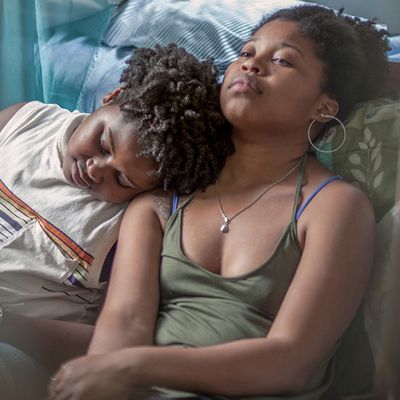
The protagonist of Jordana Spiro’s Night Comes On is named “Angel Lamere,” a not-so-subtle signifier that her essential nature is good and that she yearns for la mer, the sea. It’s all there in the first shot, of the younger Angel curled up in bed with her mother, who was subsequently killed, and the older’s Angel’s recollection (in voice-over) that her mom used to say that if you closed your eyes, a passing car could sound like the ocean. That’s what Angel (Dominique Fishback) hears as she sits in her concrete-box room in a juvenile-detention facility: first the waves and then, as Angel returns to earth, the cars. It’s two days before her 18th birthday, and she’s about to be released on parole. But she’s not heading out into a hopeful sunrise. That night is coming on is signaled by one of Angel’s first orders of business: to buy a gun. She’s an avenging angel.
Spiro has been a popular TV star (My Boys, The Mob Doctor, Ozark) for decades, but there’s no residue of network drama in her directorial debut, which she wrote with Angelica Nwandu. There is a kind of Sundance Screenwriting Lab tidiness in the structure, in how the themes are laid out, and in such names as “Angel Lamere.” But Night Comes On has a winning naturalism. Though slow, it’s intense, and you’re hooked from its first scene — Angel’s final meeting with the detention authorities — to its last, wrenching image. Spiro is a real filmmaker.
She has given the film a melodramatic structure — Angel’s drive for revenge. But it’s the young woman’s inner chaos, her sense that she’s adrift in a world with no just authority, that suffuses every frame. Although Angel was jailed for carrying a weapon, she’s not responsible for the tragedy that set her life on its current course. The question is whether her determination to kill the person who is the cause (and the consequences that will bring) is inexorable. Spiro subtly puts the film on the side of the exorable. Much is beyond her control, including the apparent rejection of her lover (Cymbal Byrd), with whom she thought she’d be living. But much is a matter of choice. Spiro’s humanism is also in every frame. Angel, the film suggests, is free to create her life anew. The key is what she does about her little sister, Abby (Tatum Marilyn Hall), who’s in foster care and stands a chance of moving beyond her mother’s death.
Hard-edged, with muscles she has built for her own protection, Fishback’s Angel holds the camera through all her wanderings. Her eyes flash with hurt and sometimes anger at what people have that she doesn’t — family, money, a sense of order. But suddenly there is Hall’s Abby, with her soft face and body, and Angel’s anger seems pointless, maladaptive. Both performances are perfect. So are the actors in supporting roles, from Max Casella’s friendly and then predatory gun dealer to John Jelks as the girls’ father. Charismatic, sunk into himself in shame but alert and wary, Jelks’s John Lemere is the scariest kind of abuser — one a little girl wants to love.
The emotions onscreen are unruly enough to overcome the screenplay’s fine carpentry and an occasional scene that’s too on the nose. Like Moonlight, Night Comes On takes much of its soulfulness from la mer and people’s capacity for rebirth in its waters. This is a lovely, inspiring film.


